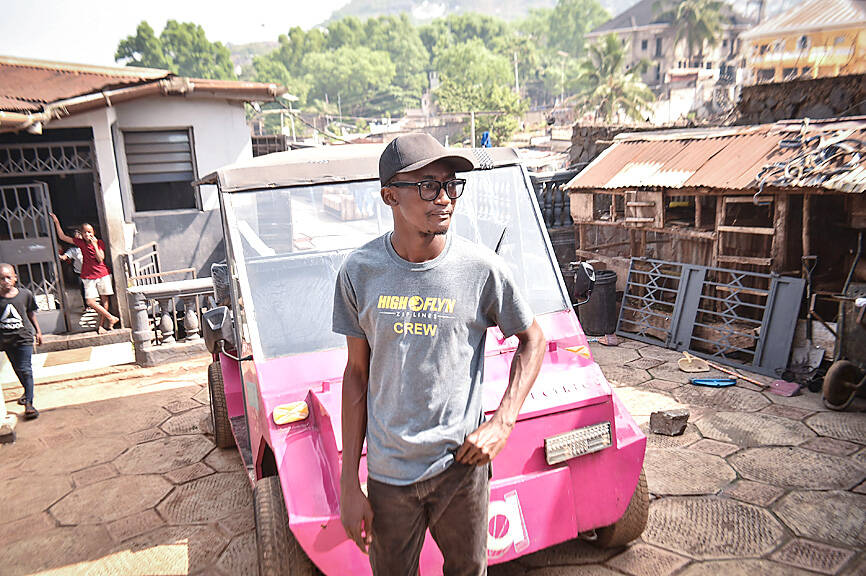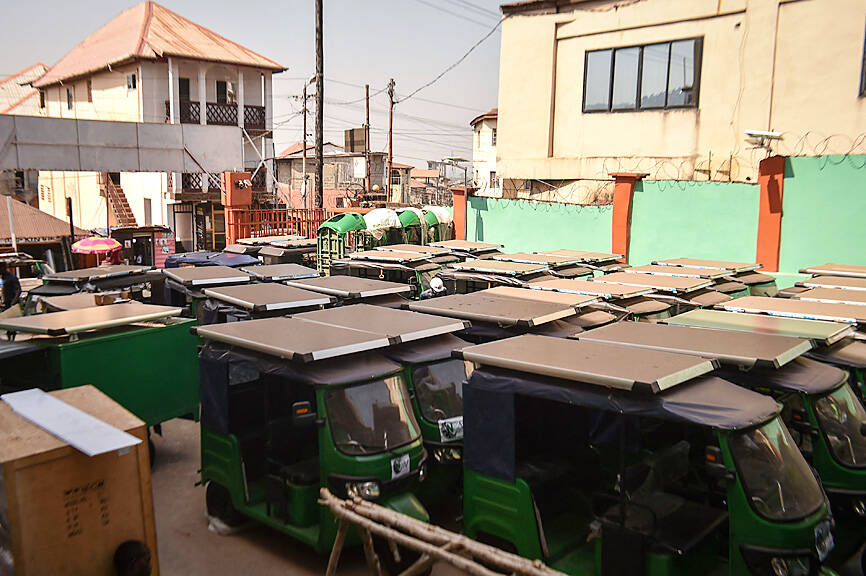In his small Freetown workshop, engineering student James Samba tinkered with batteries and electrical parts he hoped could help clean up Sierra Leone’s polluting public transport system.
Rush hour in the west African country’s major cities is a frenetic medley of minibuses, mopeds, shared taxis and three-wheeled vehicles known as kekehs — each spluttering toxic emissions into the atmosphere.
Samba said that his uncle died from a respiratory illness after years of inhaling roadside exhaust fumes, spurring the 23-year-old to develop his own model for an electric kekeh.

Photo: AFP
Assembled from recycled scrap metal and powered by batteries, the pink four-wheeled vehicle now roams the streets of the capital.
Although the project is still in its infancy, Samba aims to offer an eco-friendly alternative to traditional fuel-run models.
“I wanted to save others from dying of lung and respiratory disease due to air pollution ... by manufacturing a prototype electric vehicle,” Samba said.

Photo: AFP
Worldwide, an estimated 4.2 million premature deaths per year are attributed to outdoor air pollution, the WHO says, with low and middle-income countries overwhelmingly affected.
Like in much of west Africa, lengthy traffic jams in Sierra Leone’s major cities and poorly maintained vehicles with inefficient exhausts exacerbate the emissions problem.
The UN Environment Program says that in 2021, fine particle air pollution killed 1,200 people in Sierra Leone, a country of 8.5 million people.
Samba first ventured into engineering when he built an electric wheelchair for his uncle, who had long struggled to access public transport.
He has since set up his own company, Sierra Electric, with the aim of eventually manufacturing a fleet of solar-powered kekehs and disability-friendly electric vehicles.
Lacking the immediate means to cover production costs, Samba has partnered with start-up NEEV Salone to develop a kekeh powered by a rooftop solar panel.
The Freetown-based firm already has a fleet of more than 100 solar tricycles, three charging stations and battery swapping cabinets for customers, according to cofounder and operations officer Emmanuella Sandy.
“Our e-kekeh products are thriving. We swap batteries to reduce waiting time for commercial riders and we have trained 60 university students from the mechanical engineering department on electric vehicle assembly and maintenance,” Sandy said.
The development of electric vehicles faces numerous hurdles in Sierra Leone, where the national grid suffers from chronic underperformance and frequent outages, and a six-month rainy season hampers the functioning of solar panels.
Just over 20 percent of households have access to electricity via the national grid or mini-grids, the World Bank said in a report this year.
NEEV Salone alternates between solar power, off-grid generators and the national grid to maintain supply to its charging points.
Samba said that solar kekehs are cheaper to run than fuel-powered alternatives, as drivers face lower maintenance costs and no fuel bills.
The smallest of NEEV Salone’s solar kekehs sells for 120 million new leones (US$5,270), a high price for those living in one of the world’s poorest countries.
Despite the cost, some drivers have already converted to renewables in the face of rising fuel prices.
“The solar tricycle is comfortable and a profitable business. I no longer worry about fuel scarcity in the country,” 25-year-old driver Thomas Kanu said. “The solar kekeh is good for business and our environment.”

ELECTION DISTRACTION? When attention shifted away from the fight against the militants to politics, losses and setbacks in the battlefield increased, an analyst said Recent clashes in Somalia’s semi-autonomous Jubaland region are alarming experts, exposing cracks in the country’s federal system and creating an opening for militant group al-Shabaab to gain ground. Following years of conflict, Somalia is a loose federation of five semi-autonomous member states — Puntland, Jubaland, Galmudug, Hirshabelle and South West — that maintain often fractious relations with the central government in the capital, Mogadishu. However, ahead of elections next year, Somalia has sought to assert control over its member states, which security analysts said has created gaps for al-Shabaab infiltration. Last week, two Somalian soldiers were killed in clashes between pro-government forces and

Ten cheetah cubs held in captivity since birth and destined for international wildlife trade markets have been rescued in Somaliland, a breakaway region of Somalia. They were all in stable condition despite all of them having been undernourished and limping due to being tied in captivity for months, said Laurie Marker, founder of the Cheetah Conservation Fund, which is caring for the cubs. One eight-month-old cub was unable to walk after been tied up for six months, while a five-month-old was “very malnourished [a bag of bones], with sores all over her body and full of botfly maggots which are under the

BRUSHED OFF: An ambassador to Australia previously said that Beijing does not see a reason to apologize for its naval exercises and military maneuvers in international areas China set off alarm bells in New Zealand when it dispatched powerful warships on unprecedented missions in the South Pacific without explanation, military documents showed. Beijing has spent years expanding its reach in the southern Pacific Ocean, courting island nations with new hospitals, freshly paved roads and generous offers of climate aid. However, these diplomatic efforts have increasingly been accompanied by more overt displays of military power. Three Chinese warships sailed the Tasman Sea between Australia and New Zealand in February, the first time such a task group had been sighted in those waters. “We have never seen vessels with this capability

‘NO INTEGRITY’: The chief judge expressed concern over how the sentence would be perceived given that military detention is believed to be easier than civilian prison A military court yesterday sentenced a New Zealand soldier to two years’ detention for attempting to spy for a foreign power. The soldier, whose name has been suppressed, admitted to attempted espionage, accessing a computer system for a dishonest purpose and knowingly possessing an objectionable publication. He was ordered into military detention at Burnham Military Camp near Christchurch and would be dismissed from the New Zealand Defence Force at the end of his sentence. His admission and its acceptance by the court marked the first spying conviction in New Zealand’s history. The soldier would be paid at half his previous rate until his dismissal